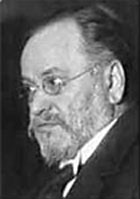Leo Motzkin
Leo Motzkin (also: Mozkin ; * 1867 in Brovary near Kiev ; † November 7, 1933 in Paris ) was a Zionist leader and a pioneer of modern minority law.
Act
He grew up in a traditional Jewish family and had to witness the pogrom in Kiev in 1881 as a child . He studied in Berlin and was one of the founders of the Russian-Jewish Science Society (also: Russian-Jewish Scientific Association ) there in 1887 . This association mainly consisted of Russian and Galician students who were close to the Chibbat Zion movement and who later often played leading roles in Zionist agitation (e.g. Fabius Schach, Schemaryahu Levin , Nachman Syrkin and many others). Chaim Weizmann , who himself belonged to the association during his time in Germany, later described the association as the cradle of the Zionist movement .
After completing his mathematics studies, Leo Motzkin devoted himself to the further development of the Zionist cause. He was a participant in the 1st Zionist Congress (1897), became a member of the Zionist Organization and, together with Herzl , resolutely advocated the implementation of the Basel program. Before the 2nd Congress he was in Palestine on behalf of Herzl to investigate and evaluate the settlement activities at that time. In his report to Congress, Motzkin criticized the settlement methods of Baron Rothschild and his supporter Chowewe Zion , of whom he had previously belonged. He demanded a political agreement with the Turkish government.
Despite his fundamental agreement with Herzl, Motzkin represented the Democratic Group at the 5th Congress (1901) . With regard to the British Uganda program , he could not bring himself to a decision, so that he eluded the relevant debate. With anti-Semitism and the plight of the Jews in mind, in the following years he became involved in the defense against hostility towards Jews and worked out historical studies and practical concepts for solving immediate tasks.
During the First World War Motzkin headed the Copenhagen office of the Zionist Organization and acted as a contact person between the Zionist organizations in the war countries. In 1915 he went to the United States to raise money for the Jewish war refugees and the emancipation struggle of the Russian Jews. After the end of the war, he asked the Zionist organization to focus on safeguarding civil rights in the Jewish diaspora . He played a leading role in founding the Committee of Jewish Delegations at the Paris Peace Conference in 1919 . The committee later became a permanent body of the League of Nations and represented the interests of the Diaspora Judaism .
Motzkin viewed the Jews as an ethnic minority and represented Jewish interest groups from 1925 to 1933 as a permanent delegate at the European Nationalities Congress . During the same period he was President of the World Zionist Organization (WZO). After the National Socialists came to power , Motzkin became involved in the interests of German Jews and tried to get the League of Nations to intervene. He tirelessly tried to obtain political and financial aid for the German Jews. When he died in Paris in 1933, Mayer Ebner succeeded him as Vice President of the World Zionist Organization.
In 1939 a selection of Motzkin's writings and speeches ( Sefer Motzkin ) appeared. The city of Kirjat Motzkin in northern Israel is named in his honor.
Publications
- The Jewish Question of the Present: Document Collection / Edited by Leon Chasanowitsch, Judäa Verlag, Stockholm 1919
- Posthumously as President of the Comité des Délégations Juives (ed.): The Black Book: Facts and Documents; The situation of the Jews in Germany in 1933 . Appeared anonymously. Edited by Rudolf Olden, Paris 1934. Reprint of the 1934 edition. Ullstein, Frankfurt 1983. ISBN 3-550-07960-5
literature
- Alexander Bein (Ed.), The Mozkin Book , Jerusalem 1939
- John F. Oppenheimer (Red.) And a .: Lexicon of Judaism. 2nd Edition. Bertelsmann Lexikon Verlag, Gütersloh u. a. 1971, ISBN 3-570-05964-2 , Sp. 526.
Individual evidence
- ^ Albert S. Kotowski: Poland's policy towards its German minority 1919-1939. Otto Harrassowitz Verlag, 1998, p. 189.
| personal data | |
|---|---|
| SURNAME | Motzkin, Leo |
| ALTERNATIVE NAMES | Mozkin, Leo |
| BRIEF DESCRIPTION | Zionist leader, champion of modern minority law |
| DATE OF BIRTH | 1867 |
| PLACE OF BIRTH | Brovary |
| DATE OF DEATH | November 7, 1933 |
| Place of death | Paris |
